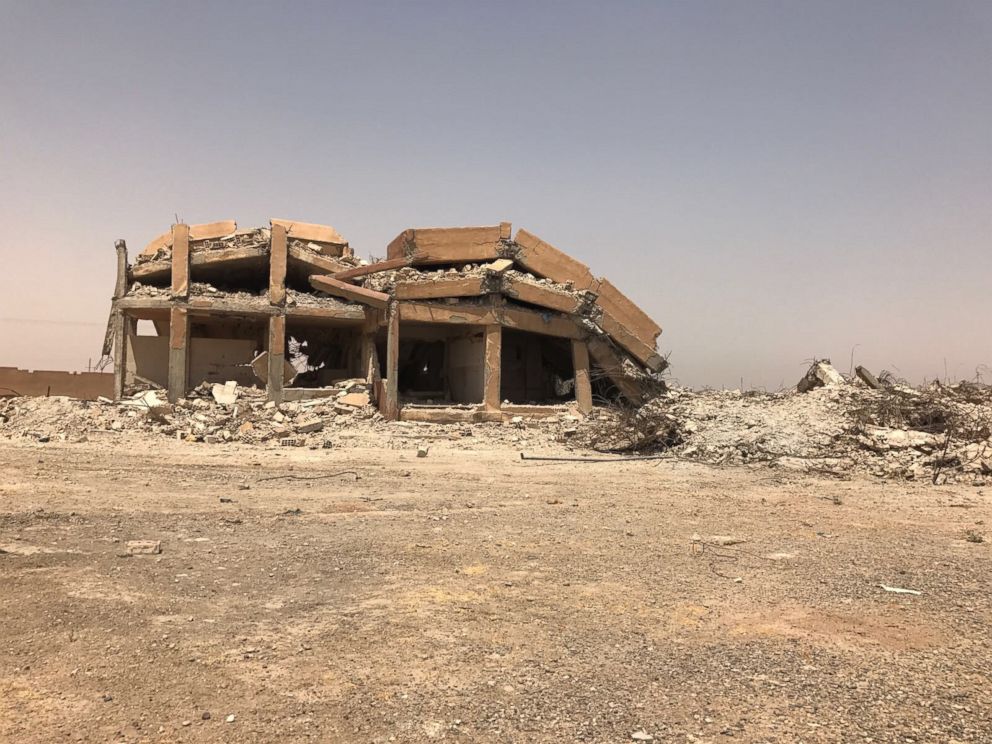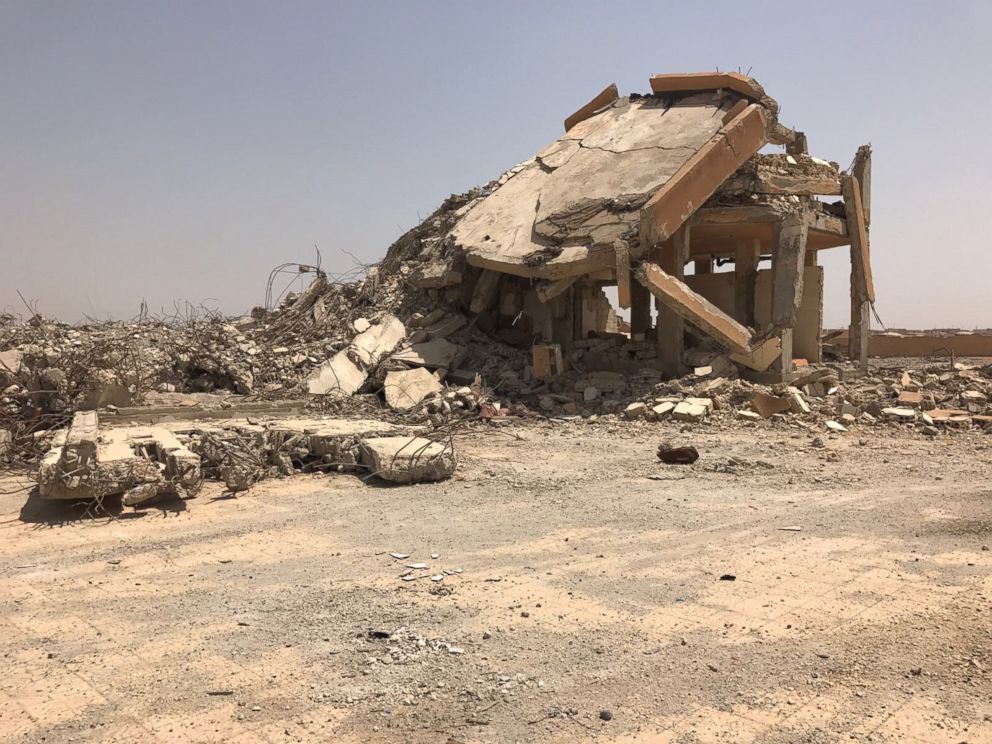US-led airstrikes near Raqqa in March killed at least 84 civilians, including 30 children: Human Rights Watch
The nonprofit released a new report on Monday.
— -- Airstrikes on a market and a school near Raqqa, Syria, in March killed at least 84 civilians, including 30 children, raising concerns that U.S.-led coalition forces fighting ISIS did not take the necessary precautions to avoid civilian casualties, Human Rights Watch said Monday in a new report.
Human Rights Watch visited the sites of the attacks in July: a school in Mansourah and a market in Tabqa, towns west of the city of Raqqa. Survivors, local residents and relatives of those killed told the international organization that dozens of civilians were at the sites when the attacks took place. Independent reporting by ABC News corroborated some of the findings.
The attacks were part of the U.S.-led coalition’s military offensive to take Raqqa, ISIS’ de facto capital in Syria. A spokesperson for the Combined Joint Task Force, which was established by the Department of Defense to coordinate military actions against ISIS in Iraq and Syria, confirmed to ABC News Tuesday that the U.S.-led coalition carried out the attack on the school building in Mansourah on March 20, but that "the alleged civilian casualties was assessed to be non-credible after a review of strike logs and strike video footage revealed no signs of civilian use of the area before the strike, and no signs of civilians in the area immediately after the strike."
The allegation about civilian casualties in the Tabqah market attack on March 22 is still being assessed, the spokesperson said, adding that it is not the task force's policy to send investigators to the site of an attack when assessing whether civilians were killed.
Dozens of civilians killed
Human Rights Watch published the names of 40 civilians, including 16 children, it said died in the March 20 attack on the school in Mansourah, which housed displaced families, according to locals. Moreover, the names of 44 civilians, including at least 14 children, who the group said had died in the March 22 attack on the market in Tabqa were also published. Many of them were killed while lining up to buy bread from a bakery, Human Rights Watch said. The report said that the civilian death toll may be higher than the total of 84. The findings are based on an on-the-ground investigation conducted during July's visit.
“What stayed with me was that the coalition on one hand had these powerful tools from the sky, yet, on the ground there is not enough attention to the well-being of the people,” Nadim Houry, director of Human Rights Watch’s terrorism and counter-terrorism program, who visited the sites, told ABC News. Two things struck him most during his stay there, he said: the scale of the destruction and the lack of follow-up services to help survivors and families of victims. “No one had come to try to help them dig out their loved ones from under the rubble,” he said.
When he visited the market in Tabqa more than three months after the attack, bodies were still buried under the rubble. He met a father who said he lost his daughter in the strike. She died while lining up to buy bread from the bakery, he said. Since the attack, her father said he has tried to dig in the rubble with his own hands to find her body. In the meantime, Americans tried to ask him if he had any information on foreign ISIS fighters, he told Human Rights Watch.
“He was so offended that instead of coming to him to try to help him get back his daughter’s body, they were there to say 'give us info about ISIS,'” Houry said.
The attack on the market came as a surprise to the residents because it happened in the middle of the afternoon, Houry said.

The attacks by coalition forces raises concerns about how they assess whether civilians are near a target, said Houry. If the coalition knew about the civilian presence but decided to strike anyway, it may be a violation of international law, he said.
“It’s not enough to just rely on intel from the sky, and now that [the U.S.-led coalition] have retaken these areas we’re calling on them to do a proper investigation, to interview survivors, neighbors and witnesses about what happened,” Houry explained. “And in addition to that compensate the families and survivors for their losses.”
Eyewitness accounts
When Abu Ammar, a resident of Mansourah, heard the sound of the strike around 11 p.m. local time on March 20, he and other civilians went to the school to help, he said.
"The dead were mostly civilian," Abu Ammar, who asked that his real name not be published out of concerns for his safety, told ABC News in Arabic. "There were maybe two or three ISIS families that ISIS came and took and then the civilians kept working.”
He and other volunteers recovered 45 bodies on the first day, he said. The next day, ISIS members came to the school and prevented people from removing any bodies. After they left, people continued to look for bodies for about four days, he said.
“There are still bodies in the school,” said Abu Ammar. “It was very difficult to get the bodies out because civilians did the search and rescue work.”

Muhab Nasser, an activist from Tabqa who visited the market after it was struck, said he knows of two ISIS fighters who died in the market attack: one was in an Internet café, the other was in a car nearby. The rest of the killed were civilian, he said.
In the market's bakery, employees burnt to death, residents told him. There was an oil tank inside and the fire lasted for about a week, he said. “People were asking for firefighters, but they weren’t coming,” Nasser told ABC News in Arabic. “When they asked, ‘Why aren’t you coming?’ They said ‘ISIS didn’t allow us.’”
According to Human Rights Watch, local residents who were interviewed said it was well-known that there were many civilians at both sites. The school in Mansourah had long hosted displaced civilians fleeing other parts of Syria, and civilians had used the Tabqa market throughout the war.
Civilian casualties "regrettable"
A Combined Joint Task Force spokesperson told ABC News that the coalition aims to minimize risks to civilians and civilian infrastructure. "We work diligently to be as precise as possible," the spokesperson said. "Any civilian casualties are regrettable and we have a robust process that is intended to determine if our airstrikes did in fact result in civilian casualties. For the sake of transparency, we also publicize not only the strikes we conduct, but also the assessments we complete each month."
The Human Rights Watch report noted that statements from U.S. government officials indicate that U.S. authorities have changed the process for approval of strikes in ways that could have contributed to higher civilian casualties. During a press briefing in May, U.S. Secretary of Defense James Mattis said that President Trump ordered the military to accelerate the campaign against ISIS and that officials were now authorized to approve strikes at a lower level than in the past. In the same briefing, Mattis emphasized that there has been no change to the rules of engagement.
“However, it is hard to imagine that delegating the strike authority to a lower level in order to more aggressively attack the enemy would not impact the extent or effectiveness of precautions coalition forces take to minimize civilian harm,” Human Rights Watch said in the report.
As the battle to take Raqqa nears its end, the aerial campaign there has reportedly intensified. According to Airwars, a London-based monitoring group, the U.S.-led coalition forces fired 10 times more munitions into Raqqa than were released by U.S. aircraft across all of Afghanistan during the month of August. The airstrikes led to at least 430 civilians deaths in Raqqa last month, Airwars said.



